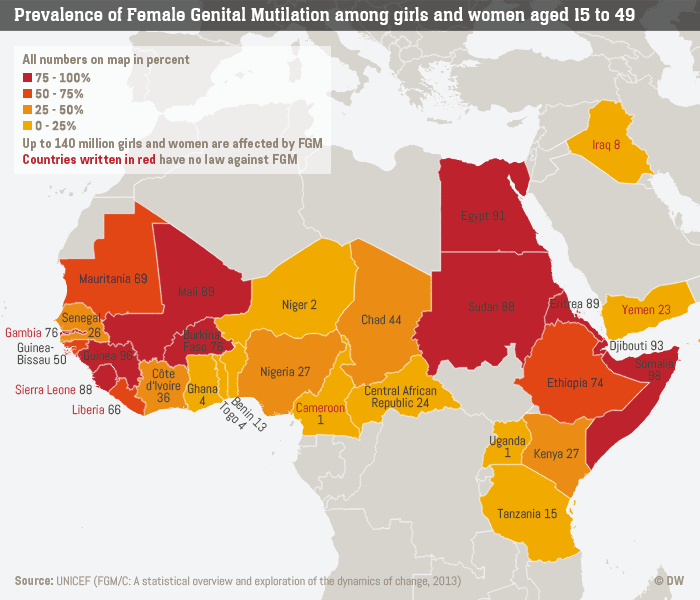AMSTERDAM, JUNE 28, 2021- African Women Rights Advocates (AWRA) calls on the government of Mali to take immediate action to protect women and girls from female genital mutilation (FGM) and gender-based violence, particularly during times of heightened political conflict.
Over a span of nine months, Mali has seen two military coups that have left the country in a difficult state. The first coup brought forth economic sanctions, which increased the country’s economic struggles during Covid-19. The West African nation also faces militant unrest, and was suspended from the African Union following the second coup.
In times of conflict, the rights of women and girls, particularly disabled women and survivors of gender-based violence, are often overlooked. The Malian government has also failed to criminalize and apply effective laws and policies to end FGM. During times of civil unrest, the rates of FGM and gender-based violence significantly increase. In Mali, about 91 percent of women and girls aged 15-49 have undergone some form of FGM, according to the United Nations Population Fund (UNFPA).
In June 2020, a UN Women rights committee found that Mali’s inability to condemn FGM, permitting the inhumane practice to proceed without any potential repercussions, brought about the infringement upon women’s fundamental rights. The report came after the Committee of the Elimination of Discrimination against Women (CEDAW) visited Mali in 2018 and found that a huge number of women and young girls in the country are exposed to “grave and systematic violations of rights” through FGM, a customary practice that includes partial or total removal of the female clitoris.
The government’s efforts to raise awareness regarding FGM’s destructive impact on women and girls, both psychologically and physically have been lacking. Mali’s government must confront the social, religious, and culture impediments to the efforts of eliminating gender-based violence and FGM, and even more so now during times of conflict.
From 2002 to 2017, Malian religious leaders opposed the bills to criminalize FGM and gender-based violence. This is devastating to the advancement of women’s rights in the country. Most African countries have already implemented national legislation to ban FGM. However, Mali falls as one of the last countries without legal framework that criminalizes FGM.


AWRA calls on Mali to improve access to justice for survivors of gender-based violence, as well as to ensure that women and girls can file complaints and report perpetrators. We also call on the health ministry to provide a reliable healthcare system for FGM and GBV survivors, particularly during times of heightened conflict and civil unrest.
Around half of the Malian population is women. The government must raise awareness against FGM and increase its investments in campaigns that support women and girls. Mali’s legal and educational systems must also end gender discrimination and offer emotional and psychological support to survivors of FGM and gender violence.
AWRA calls on Mali to protect women and girls from FGM and gender violence during times of conflict
A Malian refugee woman in Mangaize, northern Niger in 2012. (Source: WikiMedia)
A Malian refugee woman in Mangaize, northern Niger in 2012. (Source: WikiMedia)
AMSTERDAM, JUNE 28, 2021- African Women Rights Advocates (AWRA) calls on the government of Mali to take immediate action to protect women and girls from female genital mutilation (FGM) and gender-based violence, particularly during times of heightened political conflict.
Over a span of nine months, Mali has seen two military coups that have left the country in a difficult state. The first coup brought forth economic sanctions, which increased the country’s economic struggles during Covid-19. The West African nation also faces militant unrest, and was suspended from the African Union following the second coup.
In times of conflict, the rights of women and girls, particularly disabled women and survivors of gender-based violence, are often overlooked. The Malian government has also failed to criminalize and apply effective laws and policies to end FGM. During times of civil unrest, the rates of FGM and gender-based violence significantly increase. In Mali, about 91 percent of women and girls aged 15-49 have undergone some form of FGM, according to the United Nations Population Fund (UNFPA).
In June 2020, a UN Women rights committee found that Mali’s inability to condemn FGM, permitting the inhumane practice to proceed without any potential repercussions, brought about the infringement upon women’s fundamental rights. The report came after the Committee of the Elimination of Discrimination against Women (CEDAW) visited Mali in 2018 and found that a huge number of women and young girls in the country are exposed to “grave and systematic violations of rights” through FGM, a customary practice that includes partial or total removal of the female clitoris.
The government’s efforts to raise awareness regarding FGM’s destructive impact on women and girls, both psychologically and physically have been lacking. Mali’s government must confront the social, religious, and culture impediments to the efforts of eliminating gender-based violence and FGM, and even more so now during times of conflict.
From 2002 to 2017, Malian religious leaders opposed the bills to criminalize FGM and gender-based violence. This is devastating to the advancement of women’s rights in the country. Most African countries have already implemented national legislation to ban FGM. However, Mali falls as one of the last countries without legal framework that criminalizes FGM.
AWRA calls on Mali to improve access to justice for survivors of gender-based violence, as well as to ensure that women and girls can file complaints and report perpetrators. We also call on the health ministry to provide a reliable healthcare system for FGM and GBV survivors, particularly during times of heightened conflict and civil unrest.
Around half of the Malian population is women. The government must raise awareness against FGM and increase its investments in campaigns that support women and girls. Mali’s legal and educational systems must also end gender discrimination and offer emotional and psychological support to survivors of FGM and gender violence.
Share this:
The Author
Esraa Wagih